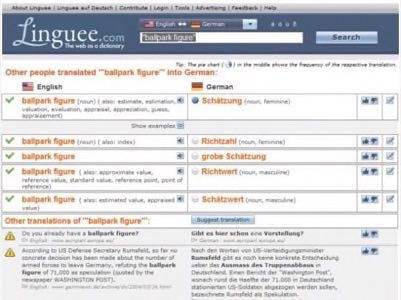Automatic translation tools like Google Translate allow you to get a very rough understanding of a text in a foreign language. For the most part, though, these translations are anything but perfect and can’t capture the nuances and idioms that professional translators can. Linguee, a Germany-based startup, is a contextual translation search engine that walks the middle ground between machine translation and online dictionary (with some crowdsourcing mixed in for good measure). The tool offers support for English, Spanish, Portuguese, German and French and is one of the best online translation dictionaries we have seen.

The Web as a Dictionary
Unlike most of the online dictionaries you are probably familiar with, Linguee doesn’t just replicate a licensed version of a print dictionary. Linguee also offers regular dictionary definitions, but what sets it apart from its competition is that the Linguee team developed something akin to a translation search engine. The company’s webcrawler looks for professionally translated texts on the public Internet that exist in two or more languages. The European Union, for example, publishes most of its documents and patents in numerous languages (as does the Canadian government). Linguee also looks for professionally translated texts on company websites and other public resources such as technical journals. Because of this wide range of source texts, Linguee often knows the translations of words that would otherwise only appear in highly specialized translation dictionaries.

Once indexed, the company’s algorithms then a) decide whether the quality of the crawled translation is good enough (does the length of the two texts match, for example) and b) create a translation index for the words and idioms in these texts. As Finke told us, the theory behind the company’s tools is well known among academics, but before Linguee came along, nobody had really put these theories to work yet.
As Linguee’s co-founder Leonard Finke told us earlier this week, thanks to this approach, the tools excels in handling words that have multiple meanings and in translation idiomatic expressions. While Google Translate, for example, turns “ballpark figure” into “Ballpark Abbildung” in German (a picture in or of a ballpark), Linguee knows the right translation (“Schätzung”). In addition to the translation itself, Linguee also displays examples of the searched for words in context.
Besides the web version of the dictionary, Linguee also offers plugins for Firefox and Internet Explorer, as well as a dashboard widget for OSX.
Crowdsourcing
While Linguee mostly relies on its own algorithms, users can also vote translations up and down and suggest alternative translations. These votes are then taken into account by the machine-learning algorithm.
Users who sign up for the service and offer a lot of good suggestions and contribute their own suggestions get to see an ad-free version of the site. As Finke told us, this is a good way to reward the tool’s most active users.

















